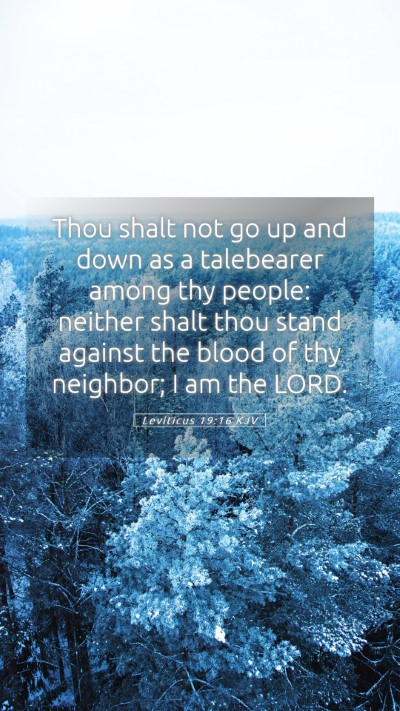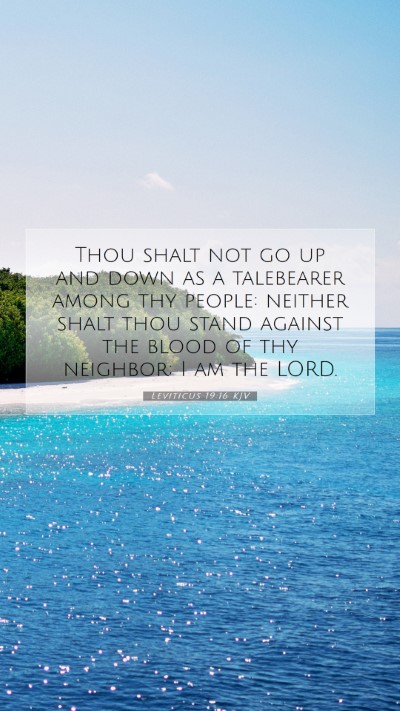Understanding Leviticus 19:16
Leviticus 19:16 states, "You shall not go about as a slanderer among your people; you shall not stand up against the blood of your neighbor: I am the LORD." This verse teaches important principles regarding community behavior, respect for others, and the sanctity of life.
Bible Verse Meanings and Interpretations
This verse is often examined in various commentaries, revealing numerous insights into its theological and practical implications.
-
Matthew Henry's Commentary:
Henry emphasizes the moral obligation to protect our neighbors’ reputations and well-being. He notes that slander disrupts the harmony within the community and goes against God's command to love one's neighbor.
-
Albert Barnes' Notes:
Barnes highlights that this command forbids malicious behavior—specifically, the act of speaking ill of others or causing harm to their lives and reputations. He stresses the divine authority backing the command, stating that God identifies Himself as the rightful judge over such actions.
-
Adam Clarke's Commentary:
Clarke elaborates on the term "slanderer," explaining that it refers not only to gossip but also to any action that brings about the downfall of another person. He connects this command to the broader context of social justice and the importance of upholding truth and righteousness in community relationships.
Key Themes in Leviticus 19:16
Several key themes can be distilled from this verse:
- Respect for Others: The command underscores the importance of respecting one another, reflecting the broader biblical principle of loving your neighbor.
- Community Integrity: The prohibition against slander emphasizes the necessity for integrity within the community, promoting unity and trust among individuals.
- Divine Justice: By invoking God's name, the verse reminds individuals that justice ultimately belongs to the Lord, who observes human actions and intentions.
Application of Leviticus 19:16
Understanding the implications of this verse extends beyond historical context to practical application today:
- Personal Conduct: Individuals are encouraged to reflect on their speech and actions, ensuring they do not participate in gossip or unfair judgment of others.
- Encouraging Positive Communication: In community or church settings, members can cultivate an environment of support and encouragement, aligning with the biblical principle of edifying one another.
- Justice Advocacy: The verse can inspire action toward social justice, standing against behaviors that harm others and advocating for the oppressed.
Bible Cross References
This verse relates well to several other scriptural passages that emphasize similar themes:
- Exodus 20:16: "You shall not bear false witness against your neighbor."
- Proverbs 11:13: "Whoever goes about slandering reveals secrets, but he who is trustworthy in spirit keeps a thing covered."
- Matthew 7:1-2: "Judge not, that you be not judged. For with the judgment you pronounce you will be judged..."
Conclusion
The verse Leviticus 19:16 serves as a powerful reminder of the significance of words and actions in our interactions with others. Through the insights from respected biblical commentators, we gain a deeper understanding of how to apply these teachings in our lives, particularly concerning respect, integrity, and justice. As we explore the Bible verse meanings, Bible verse interpretations, and Bible verse commentary, we discover both historical significance and contemporary relevance in fostering healthy relationships grounded in love and respect.
Further Study Insights
For those interested in diving deeper into this verse, consider joining a Bible study group or utilizing various Bible study tools and resources to explore the meaning of Bible verses through shared insights and discussions.


